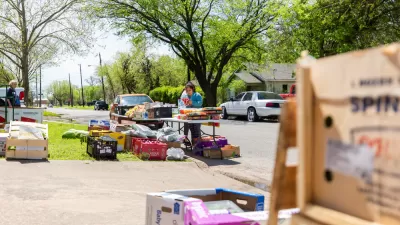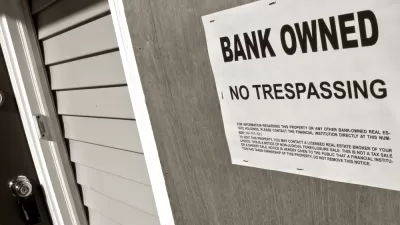The fiscal effects of the pandemic are likely to make it very difficult for governments to invest in economic and quality of life improvements for people on the edge of poverty.

Anastasia Moloney writes: "About 100 million people living in cities worldwide will likely fall into poverty due to the coronavirus pandemic, urban experts said on Wednesday, calling for mapping tools to identify vulnerable communities and investment focusing on slum areas."
The article cites experts from the World Bank, the World Resources Institute (WRI), and other urban studies organizations—recent participants in a webinar—in calculating this estimate.
Ani Dasgupta, global director of the WRI Ross Center for Sustainable Cities, is quoted in the article saying the crisis requires a new approach—not a top-down planning approach.
FULL STORY: Cities face 100 million 'new poor' in post-pandemic world - experts

Planetizen Federal Action Tracker
A weekly monitor of how Trump’s orders and actions are impacting planners and planning in America.

Maui's Vacation Rental Debate Turns Ugly
Verbal attacks, misinformation campaigns and fistfights plague a high-stakes debate to convert thousands of vacation rentals into long-term housing.

San Francisco Suspends Traffic Calming Amidst Record Deaths
Citing “a challenging fiscal landscape,” the city will cease the program on the heels of 42 traffic deaths, including 24 pedestrians.

Amtrak Rolls Out New Orleans to Alabama “Mardi Gras” Train
The new service will operate morning and evening departures between Mobile and New Orleans.

The Subversive Car-Free Guide to Trump's Great American Road Trip
Car-free ways to access Chicagoland’s best tourist attractions.

San Antonio and Austin are Fusing Into one Massive Megaregion
The region spanning the two central Texas cities is growing fast, posing challenges for local infrastructure and water supplies.
Urban Design for Planners 1: Software Tools
This six-course series explores essential urban design concepts using open source software and equips planners with the tools they need to participate fully in the urban design process.
Planning for Universal Design
Learn the tools for implementing Universal Design in planning regulations.
Heyer Gruel & Associates PA
JM Goldson LLC
Custer County Colorado
City of Camden Redevelopment Agency
City of Astoria
Transportation Research & Education Center (TREC) at Portland State University
Jefferson Parish Government
Camden Redevelopment Agency
City of Claremont





























